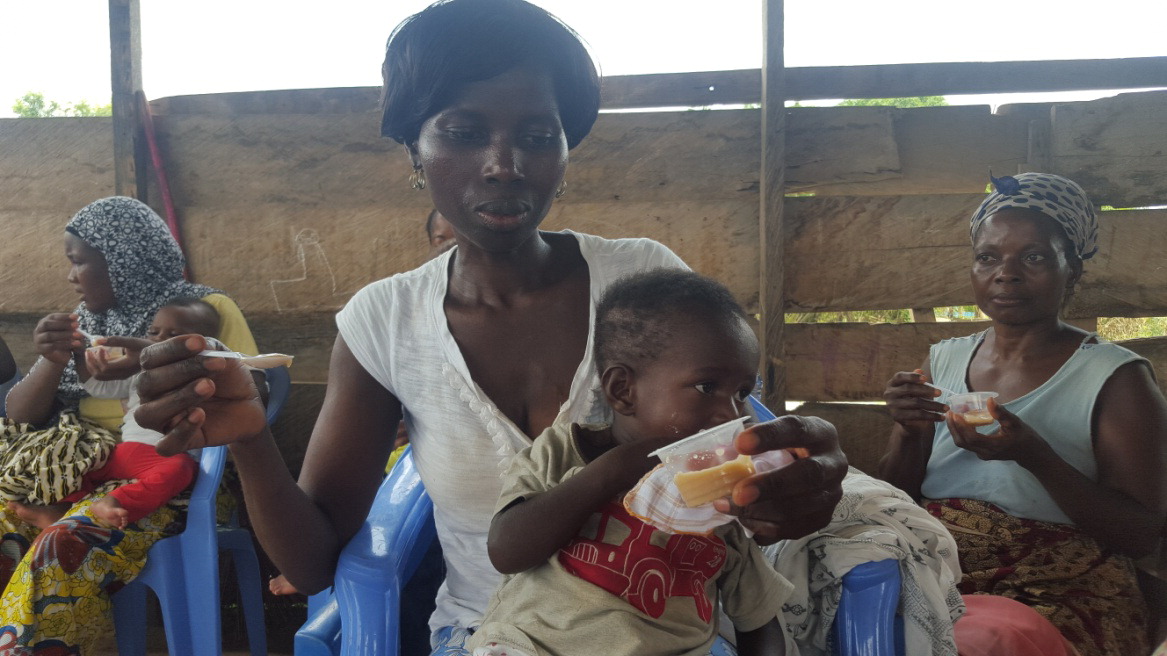The project had three main goals: (1) Develop methods to cultivate different mushrooms in Ghana and assess nutritional quality; (2) Develop a mushroom-based infant functional food; and (3) Assess the consumer acceptability of the new mushroom products. Dr. Obodai and her project team anticipated that the outcomes of the project would include four mushroom species available for use and further product development, a new market-tested mushroom-based product ready for commercialization, and a trained workforce to grow and produce the initial mushroom product. Ultimately, they hoped that expanding children’s diets to include mushroom products would reduce the burden of malnutrition and improve food security in Ghana and throughout Africa.
Over the course of the project, three mushroom-based products were developed for children ages 2 to 5, including mushroom orange-fleshed sweet potato (OFSP) mash, mushroom soup mix, and mushroom-based cereal mix. These were developed from mushroom varieties including Pleurotus ostreatus strain EM1, P. sajor-caju strain PSCW, P. tuber-regium strain PTR, Ganoderma lucidum strain GLA, Auricularia auricula strain AU, and Termitomyces species. The team also carried out sensory evaluation and consumer acceptability tests for 60 caregivers of children ages 2 to 5. The caregivers selected mushroom-based cereal mix made from Pleurotus ostreatus strain EM1 and P. sajor-caju strain PSCW for use. These caregivers were consequently trained in the cultivation and use of mushrooms for the production of mushroom-based cereal mix. Three mushroom demonstration sites were set up in Kukrantumi in the Eastern Region, Hohoe in the Volta Region, and Accra in the Greater Accra Region.
Dr. Obodai and her team also analyzed 57 mushroom samples from two selected forests (Ayum and Atiwa) for bioactive compounds such as beta-glucan, ergothioene, and vitamin D. Most of the selected species contained varying amounts of these compounds and these results form the basis for further biotechnological applications. The project published one manuscript and the PI hopes to continue her collaboration with her U.S. partner in writing future manuscripts, as the project has generated a great amount of data.
In summary, Dr. Obodai’s institution, the Council for Scientific and Industrial Research- Food Research Institute (CSIR-FRI), has incorporated the new mushroom products into the mushroom cultivation training that they conduct twice per year. The developed mushroom-based foods will also be promoted at workshops organized by CSIR-FRI. Their enhanced nutritional properties, which have been documented, will be published in leaflets and handouts and distributed at workshops organized by the Institute.
PublicationsObodai, M.; Narh Mensah, D.L.; Fernandes, Â.; Kortei, N.K.; Dzomeku, M.; Teegarden, M.; Schwartz, S.J.; Barros, L.; Prempeh, J.; Takli, R.K.; et al. Chemical Characterization and Antioxidant Potential of Wild Ganoderma Species from Ghana. Molecules 2017, 22, 196. DOI:
https://doi.org/10.3390/molecules22020196 



